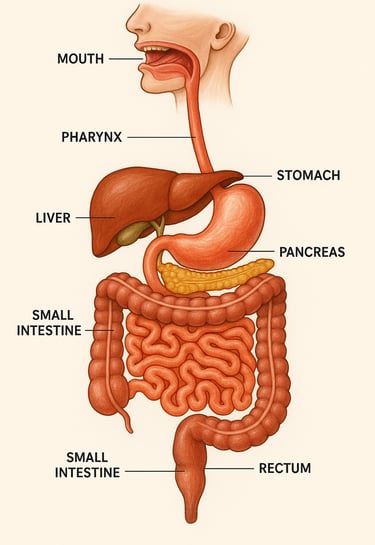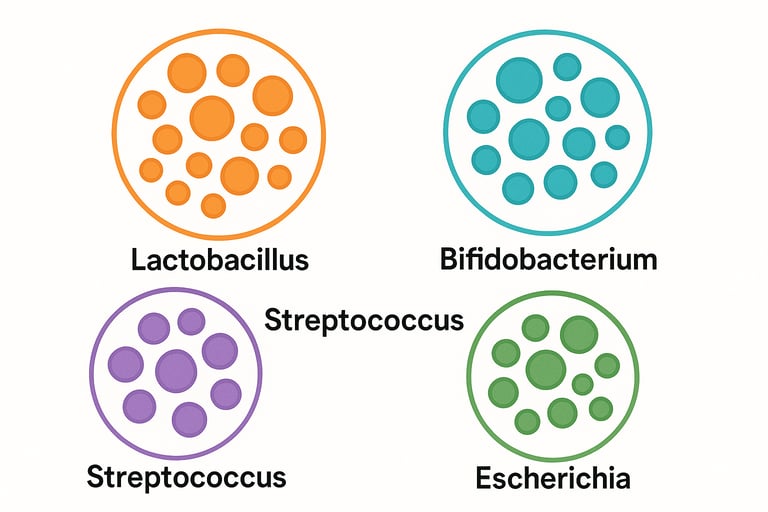"Best Probiotics for Gut Health 2025: 7 Strains That Actually Work [Science-Backed]"
"Best probiotics for gut health & immunity: See which 7 strains work, 10B vs 100B CFU comparison, natural vs supplements + how to choose the right probiotic for $15-50."
UNDERSTAND YOUR SUPPLEMENTS


Understanding Probiotics: The Complete Guide to Gut Health and Beyond
Probiotics are live microorganisms that provide significant health benefits when consumed in adequate amounts, serving as powerful allies for digestive wellness and overall health. These beneficial bacteria are naturally found in fermented foods and available as targeted supplements, offering a scientifically backed approach to supporting your body's complex microbial ecosystem.
The Science Behind Probiotics
Probiotics function by enhancing gut barrier function, producing antimicrobial substances, and modulating immune responses. Research demonstrates that these microorganisms play a crucial role in regulating the gut microbiota, boosting overall immunity, and increasing the abundance of beneficial bacteria while helping ameliorate symptoms of multiple diseases.
The two most extensively studied and clinically effective probiotic genera are Lactobacillus and Bifidobacterium. These strains have shown remarkable efficacy in treating various conditions, from colon cancer and colorectal cancer to gastrointestinal pathologies and acute diarrhea. Clinical studies reveal that certain strains can reduce virus titers by up to 99.4% in laboratory settings, demonstrating their potent antimicrobial properties.
Natural vs. Synthetic Sources: Maximizing Benefits
Food-based probiotics emerge through natural bacterial fermentation processes and are considered the most beneficial for daily health maintenance. Popular fermented foods include:
Kefir: Contains diverse probiotic strains and may help reduce inflammation while supporting immune function
Kimchi: Rich in probiotics that may improve gut health and relieve digestive issues like bloating and abdominal pain
Kombucha: Provides living microorganisms that support digestive health
Yogurt with live cultures: Offers easily accessible probiotics for daily consumption
Sauerkraut and fermented vegetables: Deliver beneficial bacteria alongside additional nutrients
Probiotic supplements are created through comprehensive cultivation processes where beneficial bacteria are grown in controlled environments, then freeze-dried and encapsulated to ensure stability and prolonged shelf-life. These supplements excel in providing targeted health support with higher potency concentrations, particularly useful for addressing specific gastrointestinal concerns or medical-grade interventions.
Advanced Probiotic Science: Synbiotics and Postbiotics
Modern probiotic science has evolved beyond simple bacterial supplementation. Synbiotics combine probiotics with prebiotics to create a synergistic effect that dramatically improves the survival and effectiveness of beneficial microbes while stimulating native bacterial growth. This combination enhances tolerance to environmental factors like temperature, oxygenation, and pH levels within the digestive tract.
Postbiotics represent the cutting edge of gut health science - these are bioactive metabolites produced during probiotic fermentation that provide health benefits even without live bacteria. Research shows postbiotics demonstrate antibacterial and anti-inflammatory properties, offering therapeutic potential for various conditions.
Comprehensive Health Benefits
Digestive and Immune Support
Probiotics strengthen mechanical, chemical, and immune barriers in the gut, reducing
inflammation, preventing leaky gut syndrome, and blocking pathogen translocation. They enhance
mucosal secretory immunoglobulin A secretion and improve
antioxidant capacity, creating a robust defense system against harmful microorganisms.
Mental Health and Cognitive Function
The gut-brain axis represents one of probiotics' most fascinating benefits. Research demonstrates that probiotics can significantly improve mood, cognitive function, and reduce stress and anxiety. Studies show that probiotic consumption can reduce depression symptoms after 8 weeks of supplementation. Some strains help produce neurotransmitters like serotonin (90% of which is made in the digestive tract), dopamine, and gamma-aminobutyric acid.
Cardiovascular Health
Recent large-scale studies reveal that probiotic use is associated with improved cardiovascular markers. Research analyzing over 46 million US adults found that probiotic exposure was linked to:
Lower A1C levels (1.6% decrease)
Reduced triglycerides (12.3% decrease)
Higher HDL cholesterol (6% increase)
Lower ASCVD risk scores (10.5% decrease)
Improved diastolic blood pressure (2.8% decrease)
Weight Management and Metabolic Health
Clinical trials demonstrate that probiotic-fiber combinations can produce remarkable weight loss results. A recent 90-day study showed participants experienced:
12.01% reduction in body weight
12.14% decrease in BMI
9.64% reduction in waist circumference
54.02% improvement in metabolic syndrome Z-score
25.75% decrease in triglycerides
Optimal Dosage and Usage Guidelines
Evidence-Based Dosage Recommendations
Clinical research consistently demonstrates that effective probiotic doses range from 10^8 to 10^10 CFU (colony-forming units) per day. More specific recommendations include:
For General Health:
Adults: 10-20 billion CFU daily for immune and digestive support
Children: 5-10 billion CFU daily
Food-based: 1-2 servings of fermented foods daily
For Targeted Health Issues:
Higher therapeutic doses: 1-10 billion CFU/day for specific conditions
Medical-grade support: Multi-strain supplements with Lactobacillus and Bifidobacterium combinations
Hospital settings: Up to 25 billion CFU daily may provide enhanced benefits
Best Forms by Health Goals
Daily Wellness: Fermented foods like yogurt, kefir, and fermented vegetables provide live cultures with additional nutrients and enzymes for overall health maintenance.
Therapeutic Applications: Capsule supplements containing multiple researched strains offer concentrated, targeted support for specific gastrointestinal conditions.
Safety Profile and Considerations
Generally Recognized as Safe
Probiotics demonstrate an excellent safety profile for most individuals. The most common side effects are mild and temporary, including:
Initial digestive adjustment: Mild bloating or gas that typically resolves within 2-3 weeks
Temporary changes: Possible alterations in bowel movements as gut microbiota adjusts
Important Precautions
Certain populations should exercise caution or avoid probiotics:
Immunocompromised individuals: Higher risk of bloodstream infections in rare cases
Severely ill patients: Those with recent surgery, HIV, or undergoing chemotherapy
Acute pancreatitis: Probiotics are contraindicated in predicted severe cases
Starting Strategy: Begin with low doses and gradually increase to allow your system to adjust, minimizing potential side effects.
Frequently Asked Questions
Q: How long should I take probiotics to see results?
A: Most people notice digestive improvements within 2-4 weeks, while more significant health benefits may take 8-12 weeks of consistent use. The beneficial effects are temporary, so continued supplementation is necessary to maintain benefits.
Q: Can probiotics help with weight management?
A: Yes, research demonstrates significant weight loss potential. Clinical studies show probiotic-fiber combinations can reduce body weight by over 12% in 90 days, along with improvements in metabolic markers.
Q: Are probiotics safe for children?
A: Yes, probiotics are generally safe for children, but pediatric dosages (5-10 billion CFU daily) and age-appropriate strains should be used. Always consult a pediatrician for personalized recommendations.
Q: Do I need to refrigerate probiotic supplements?
A: This depends on the specific formulation. Freeze-dried, encapsulated probiotics are designed for shelf stability, but refrigeration can extend viability. Always check manufacturer recommendations and expiration dates.
Q: Can I take probiotics with antibiotics?
A: Yes, but timing matters. Take probiotics at least 2 hours away from antibiotic doses, and continue probiotic supplementation for several weeks after completing antibiotic treatment to help restore gut microbiota balance.
The growing body of research surrounding probiotics reveals their potential as powerful tools for comprehensive health optimization. From digestive wellness to cardiovascular protection, mental health support, and weight management, probiotics offer a scientifically-validated approach to enhancing overall wellbeing through targeted microbiome modulation.




Connect
Stay updated with our latest diet tips.
Legal
www.thedietplanner.com © 2025. All rights reserved.